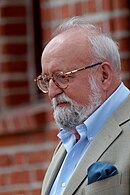| Die Teufel von Loudun | |
|---|---|
| Opera by Krzysztof Penderecki | |
 The composer in 2008 | |
| Translation | The Devils of Loudun |
| Librettist | Penderecki |
| Language | German |
| Based on | John Whiting's dramatization of Aldous Huxley's The Devils of Loudun |
| Premiere | 20 June 1969 |
Die Teufel von Loudun (The Devils of Loudun) is an opera in three acts written in 1968 and 1969 by Polish composer Krzysztof Penderecki, and then revised in 1972 and 1975. It has a German libretto by the composer, based on John Whiting's dramatization of Aldous Huxley's book of the same name.
The work was commissioned by the Hamburg State Opera, which consequently gave the premiere on 20 June 1969. Only 48 hours afterwards, the opera received its second performance in Stuttgart, followed two months later by its American debut mounted by the Santa Fe Opera.[1] The work was revised in 1972 following suggestions by Polish theatre director Kazimierz Dejmek.[2][3] This added two new scenes, excluded a scene from the opera's first act, regrouped other scenes, and modified the first act's instrumentation.[3] In 1975, Penderecki added two more scenes in the second act. He revised the entire score again in 2012.[4]
The Devils of Loudun, the first and most popular of Penderecki's operas, is emblematic of the composer's interest in historical events of traumatic nature.[5] As suggested by its title, the opera draws its story line from the 1632-38 mass demonic possession in the town of Loudun, France. However, rather than a narrative of these historical events, the opera underscores a more general dichotomy between central and local power,[6] and thus provides a political commentary, denouncing the iniquities committed by the totalitarian states of the mid-20th century.[7] Accordingly, the opera's thematic construction should be regarded as allegorical rather than merely historical.
- ^ Matthew Boyden et al., The Rough Guide to Opera (London: Rough Guides, 2002), 575.
- ^ "All About Jewish Theatre - Kazimierz Dejmek Polish Actor, Director and Minister of Culture (April 17, 1924-December 31, 2002)". Archived from the original on 2010-02-21. Retrieved 2009-05-06.
- ^ a b Barbara Malecka-Contamin, Krzysztof Penderecki: style et matériaux (Paris: Kime, 1997), 85.
- ^ Krzysztof Penderecki, Die Teufel von Loudun, Schott Music Group, Mainz 2012, https://www.schott-music.com/en/die-teufel-von-loudun-no168598.html; accessed 11 June 2022.
- ^ Adrian Thomas, "Penderecki, Krzysztof," Grove Music Online, ed. Laura Macy; available from http://www.oxfordmusiconline.com; Internet; accessed 5 March 2009.
- ^ Adrian Thomas, "Penderecki, Krzysztof," The New Grove Dictionary of Opera, ed. Stanley Sadie; available from http://www.oxfordmusiconline.com; Internet; accessed 5 March 2009.
- ^ Edward Boniecki, "Penderecki's the Devils of Loudun and the Case of Urban Grandier," in Krzysztof Penderecki's Music in the Context of the 20th-Century Theatre, ed. Teresa Malecka (Kraków: Akademia Muzyczna, 1999), 78.